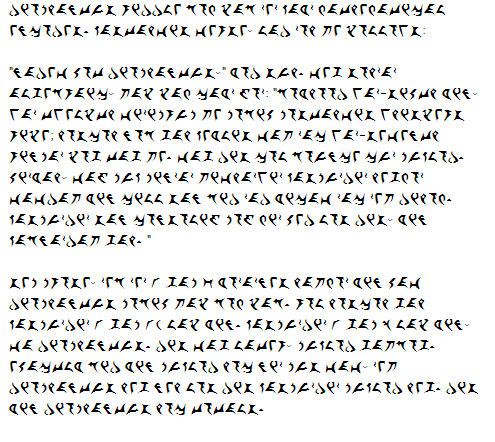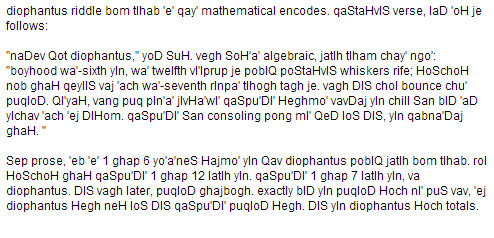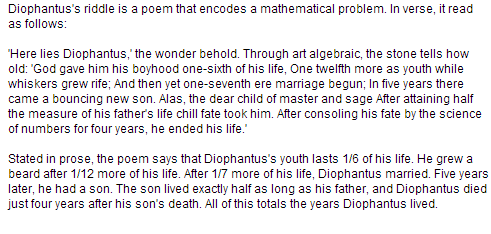On Wednesday, the A2I team at New Visions participated in an excellent workshop from Harold Asturias on English language learners in a mathematics classroom. Harold made some points about the difficulties English language learners face in a mathematics class that really drove home this point to me; mathematics teachers are teachers of language too.
To illustrate my point, try this mathematics problem:

This is what solving a word problem is like for children who either can’t read at all, or who are illiterate in the classroom language. What about this problem instead?

Here at least the character set is familiar, and you can recognize some words of the problem too. Some of you with some knowledge of the history of mathematics may even recognize a name from the problem above and be able to find out what the text of this problem is. Note that for almost anyone trying this problem, the text of the problem is still pretty close to incomprehensible.
What about this version?

(Source: Wolfram Mathworld)
This is at least readable, but it is still a challenging piece of prose to read. Hopefully you can imagine some of the stages of understanding between the second and third versions of this problem, and how challenging this kind of problem is. (Here is another example, this time from a textbook written in Thai.)
You can have issues with language result from just regular classroom discussion. Speak the following sentence aloud:
"Please take half of the peas that I have, and give two of them to him, and leave four of them for her."
For someone who is just learning English, even though the level of difficulty of the individual words in the sentence above is low, they may still have problems decoding the meaning of just this one sentence. There are many, many other examples of "difficult to decode" sentences. Note that this problem is probably not just exclusive to English Language Learners! Many native speakers of English struggle with comprehension in both the cases I’ve described above.
One solution, that I have heard proposed by some, to this problem is to remove word problems from mathematics classes. I think this solution is short-sighted. As teachers of mathematics, we are not just teaching the content of our discipline, we are also teaching the language of our discipline, and word problems are a way to build a bridge between the everyday language students have, and the academic language that mathematicians use. By removing this bridge, we would shut our students out of mathematics. If we want students to learn the language of mathematics, we must build it up from the language students know.
Another solution is to build a different kind of word problem, one not so dependent on language. While I think there are benefits to this approach, we still want students to develop mathematical language. My suggestion is to use the Three Acts type problems, and write the text of the word problem together, after students have solved the problem. This way they get a chance to develop their mathematical reasoning skills, and then develop their vocabulary for that reasoning while working on the problem. Dan Meyer demonstrates a Three Acts problem with a room of mathematics teachers. Notice how he builds up the language of the problem from the language participants use to describe it. From here, it is not too far a leap to include more of the language mathematicians would use to solve this problem.
There are ways to scaffold the use of language in your classroom without reducing mathematical difficulty. You can use daily math talks to build your students’ ability to discuss mathematics. You can be deliberate in your use of language and carefully introduce vocabulary as needed to discuss mathematical ideas, and build a word wall of the vocabulary you have introduced. You can give your students opportunities to problem solve together so that they can support each other’s use of language.
Here are some other resources you can use to help address this issue:
- Stanford’s Understanding Language page
- Virginia’s Department of Education
- Discussion frameworks: Problem stem, Writing to explain, Think/pair/share, Turn & talk to produce something, Sentence frames or starters, Solo => partners => table => whole group
What other suggestions do you have to help all of your students learn the language associated with a math classroom?
Anonymous says:
Iliterate should be illiterate!
August 12, 2013 — 7:59 am
David Wees says:
Thank you for pointing out my typo.
August 12, 2013 — 8:58 am
TheMathsMagpie says:
Hi!
We have provided some basic bi-lingual Mathematical dictionaries (with pictures where possible) for our English as an Additional Language learners.
There are some on the internet and we’ve used google translate for others. Here’s an example of a great one from emaths that I used with a Portuguese-speaking student:
http://www.emaths.co.uk/index.php?option=com_content&view=article&id=92&Itemid=483&dir=JSROOT/EAL/Portuguese&sort_by=changed&sort_as=desc
I’ve also found scaffolded role-play useful too.
Best wishes Kate
August 12, 2013 — 3:16 pm
Tracy says:
In immersion, teachers have lots of experience teaching language explicitly in the math classroom. I have a word wall in my class that I update with every unit of study where students can find phrases they will often come across in word problems and what operation they are asking for. I also have students read math with a highlighter, looking for number words and operations words.
August 12, 2013 — 4:27 pm
David Wees says:
Thank you for these other strategies, Tracy.
August 12, 2013 — 4:59 pm
Paul says:
Great post. The video is quite interesting. Thanks for sharing your thoughts!
August 13, 2013 — 11:20 am
Kate nerdypoo says:
I teach students who are predominately non-native speakers of English, and as such I’ve always thought of myself as a language teacher as well (in my school this is referred to as CLIL). But I don’t necessarily mean the language of math but making everyday connections and pushing students to see the structure of English.
So for example, when we discuss irrational numbers, we’ll talk both about what the everyday meaning of rational is and what the prefix ir- means. I ask the students to come up with other words that start with ir- and mean not something. What do these words all have in common (and why does irritate seemingly fit the pattern but not work… Is it possible there used to be a ritate that we’ve lost?). Why is it we negate these words with ir-? What other negating prefixes do we use and when? Why il-, im-, in-, un-, a-, dis-?
Another thing we talk about are words that are spelled the same and pronounced differently yet are related. This comes up during statistics when we talk about the arithMETic average (as opposed to aRITHmetic) or when we have to reJECT an answer to a problem (different from a REject). It’s fun to brainstorm these related words like convict, which most of my students don’t know. Wikipedia has a full list. it’s nice to talk about the parts of speech: if you know the word is a verb does that give a clue as to which syllable receives the emphasis?
I’ve found that when discussing the fact that multiplication is commutative, most students don’t even know the plain definition of commute (or associate or distribute).
These diversions can lead to really interesting discussions. When we do binomials we brainstorm words that start with bi- (bisexual is always the first to come up, followed by bilingual, but most students miss the connection to bicycle, most don’t know bipedal). When we talked about circumference and why does a circle have its own special word for what’s essentially perimeter? So I mentioned that circum- meant around, to which one boy said “circumcision!” Many of the students didn’t know what that was, so the boy explained. Then a Jewish girl explained the Jewish rite, a Muslim girl explained the Muslim practice, and then female circumcision got brought up (to which one of my kids said, “wait, we have a foreskin??”) And on to the topic of genital mutilation. It was a fascinating discussion and I could not have possibly foreseen it!!
I think that it’s our rule to expose students to the intricacies of our language and use vocabulary above their grade level (scaffolded of course).
June 11, 2014 — 1:01 am